Introduction
Navigating the transition of menopause can often feel overwhelming, yet it also presents a unique opportunity for women to embrace their health and well-being. As hormonal changes take center stage, understanding the implications of these shifts is crucial for fostering resilience and promoting a proactive approach to health management. From exploring dietary adjustments and exercise routines to incorporating mindfulness practices and seeking community support, women can implement effective strategies to combat challenges like hormonal belly fat.
By prioritizing their health and recognizing the power of informed choices, women can not only enhance their quality of life during menopause but also create a supportive environment that benefits their overall well-being. This article delves into the multifaceted aspects of menopause, offering insights and actionable steps that can empower women to thrive during this pivotal phase.
Understanding Menopause and Its Hormonal Effects
Menopause generally occurs in individuals between the ages of 45 and 55, marking the end of menstrual cycles and a significant decline in hormone production, particularly estrogen and progesterone. These hormonal fluctuations can lead to weight gain, especially in the abdominal area, commonly referred to as hormonal belly fat.
Research indicates that reduced estrogen levels significantly influence fat distribution, resulting in an increase in visceral fat, which is associated with an elevated risk of chronic conditions such as heart disease and certain cancers. Significantly, individuals who undergo the transition before the age of 40 face a substantially greater mortality risk from these diseases.
According to researchers from The University of Arizona College of Medicine Tucson, hormone replacement therapy (HRT) may enhance pulmonary hypertension in females, indicating that it could play a crucial role in wellness management during the transition. Furthermore, a recent case study titled "Can Hormone Replacement Therapy Help Treat Pulmonary Hypertension in Women?" highlights the potential applications of hormone therapy beyond conventional symptoms of aging.
Acknowledging these physiological shifts as a natural part of life can enable individuals to take proactive steps in managing their well-being during this crucial transition. By understanding the implications of menopause on their bodies, women can embrace this phase and implement strategies to maintain their well-being, ultimately fostering a more supportive environment in the workplace.
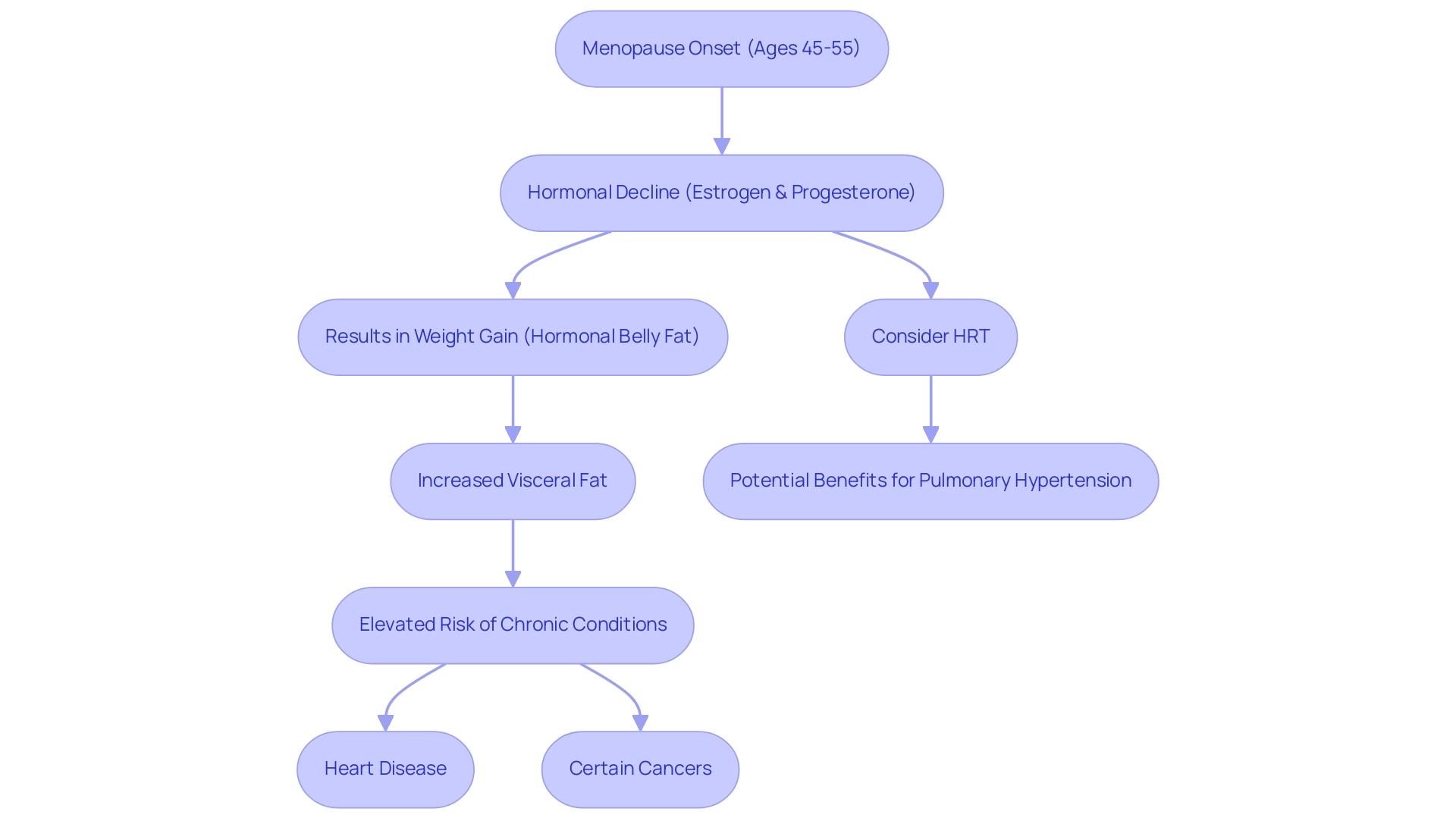
Effective Strategies for Managing Hormonal Belly Fat
To effectively manage hormonal belly fat, it’s essential to adopt a holistic approach that encompasses various lifestyle changes, supported by our comprehensive health coaching app:
- Embrace a Balanced Diet: Utilize our guided nutrition resources within the app to prioritize whole foods abundant in nutrients—think vibrant fruits and vegetables, whole grains, and lean proteins. Incorporating healthy fats, such as avocados and nuts, can be instrumental in balancing hormones and reducing inflammation. Steer clear of processed foods filled with sugars and unhealthy fats, which can worsen imbalances in hormones. Notably, statistics reveal that a staggering 17% of calories in the average diet come from sweets, highlighting the necessity of mindful dietary choices.
- Engage in Regular Exercise: Commit to a well-rounded exercise regimen with personalized workouts available in our app, including cardiovascular, strength training, and flexibility routines. With access to a 350+ movement catalog, you can diversify your workouts to keep them engaging. Aim for a minimum of 150 minutes of moderate aerobic activity weekly, complemented by strength training sessions at least twice a week. Research indicates that women in menopause can benefit from increased physical activity, as it not only helps regulate hormones but also facilitates fat loss, particularly in the abdominal area. As Aston Dommel states, "Regular exercise is crucial for maintaining balance of hormones and achieving sustainable weight management." Our app's daily programming feature ensures you stay on track with your fitness goals.
- Manage Stress Effectively: Chronic stress can significantly worsen endocrine issues. Incorporate mindfulness practices, such as guided meditations available in the app, to help mitigate stress levels and promote overall well-being.
- Prioritize Quality Sleep: Aim for 7-9 hours of restorative sleep each night. Insufficient sleep can interfere with hormone activity and lead to weight increase, highlighting the significance of creating a regular sleep routine for optimal well-being. The app provides reminders and tips to help you maintain healthy sleep habits.
- Stay Hydrated: Sufficient hydration is essential for overall well-being and can aid in weight management. Strive to consume at least eight 8-ounce glasses of water daily, and track your intake through our app to maintain proper hydration levels.
- Consult with Healthcare Experts: Regular medical check-ups are vital for tracking physiological changes and creating personalized strategies to tackle any wellness issues. Interacting with experts can offer invaluable insights into personalized wellness management, and our app enables easy communication with your coach for ongoing support.
- Case Studies and Success Stories: Consider the case of Sarah, a 54-year-old individual who adopted a balanced diet and regular exercise routine after struggling with belly fat. By following a personalized nutrition plan developed with a registered dietitian through our app and committing to strength training, she successfully lost 15 pounds and reported improved energy levels.
By incorporating these strategies with the assistance of our app, including bi-weekly group calls for community involvement and responsibility, women can take proactive measures to enhance their hormonal well-being and effectively decrease belly fat, paving the way for improved wellness during and after the transition. Remember, as Aston Dommel, a Certified Registered Dietitian, emphasizes, effective nutrition and exercise play a pivotal role in achieving sustainable health goals.
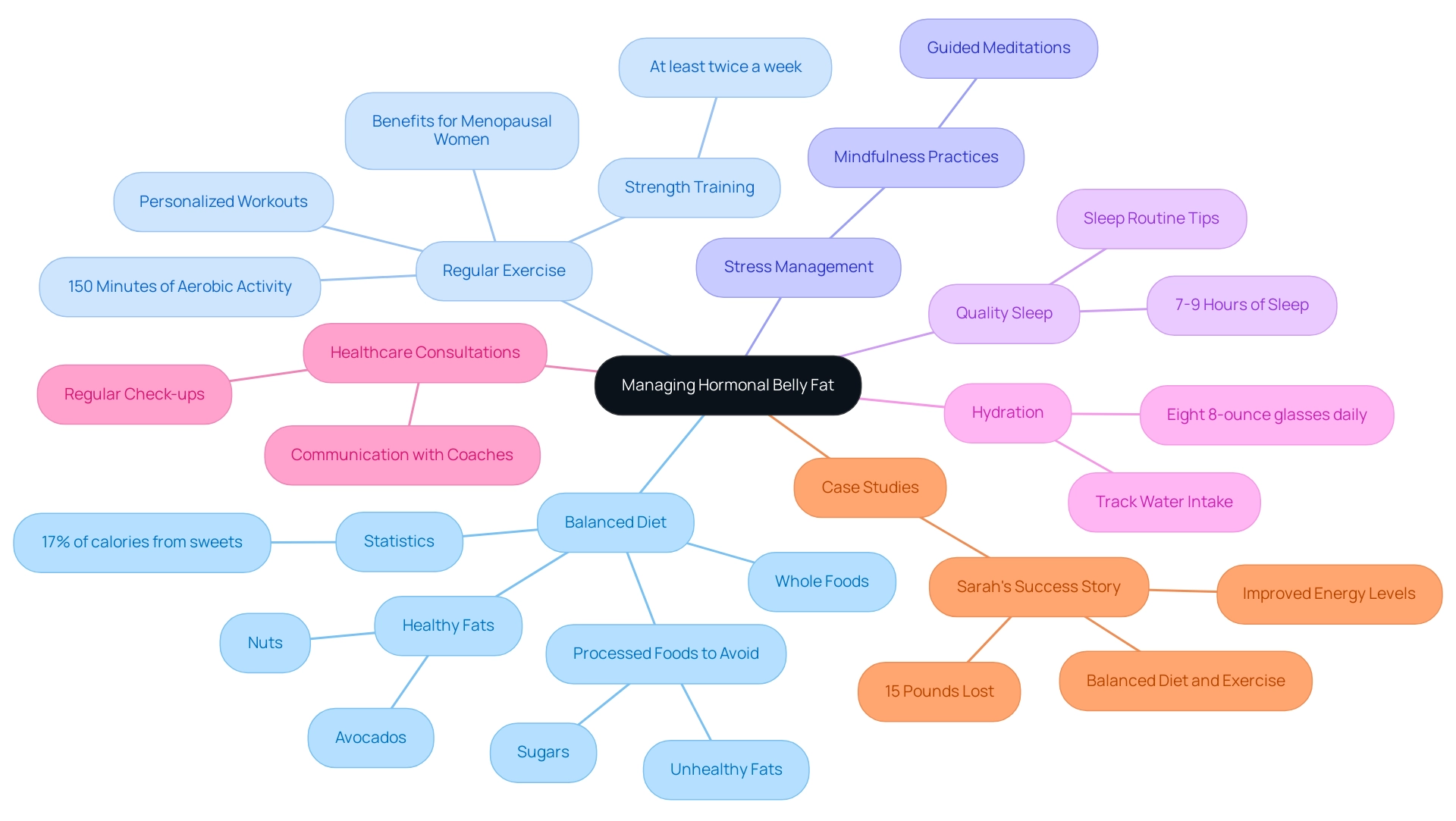
Incorporating Mindfulness Practices
Integrating mindfulness techniques into your everyday schedule can be a life-changing approach to handling stress and improving emotional health during this phase. Here are several effective techniques that can make a significant difference:
- Meditation: Dedicate a few minutes each day to meditation. Focus on your breath, allowing thoughts to come and go without judgment. This practice is not only instrumental in reducing anxiety but also enhances self-awareness, paving the way for a more balanced emotional state. Dr. Clare Spencer, co-founder and certified specialist, emphasizes that many individuals discover that creating mental headspace aids them in rebalancing, so consider trying meditation or yoga. Recent studies show that individuals who practice mindfulness meditation report a 30% reduction in anxiety symptoms during menopause.
- Yoga: Engaging in yoga offers a dual benefit: it improves flexibility and strength while also promoting relaxation and mindfulness. Participating in a course or attending online sessions specifically tailored for this life stage can offer extra support and a sense of community, alleviating the feelings of isolation that many younger individuals encounter during this transition. A case study from My Menopause Center revealed that participants in a yoga program experienced a 40% improvement in their overall well-being and a significant reduction in menopausal symptoms.
- Gratitude Journaling: Maintaining a gratitude journal can serve as a powerful tool for reflection. Regularly noting positive aspects of your life fosters a positive outlook, which can help counterbalance negative emotions during challenging times. Research indicates that individuals who engage in gratitude practices report higher levels of life satisfaction and lower levels of depression.
- Deep Breathing Exercises: Incorporate deep breathing techniques into your routine to calm your mind and body. Inhale deeply for a count of four, hold for four, and exhale for a count of four. Repeating this several times can alleviate stress and anxiety, helping you to regain control in moments of overwhelm. Recent news highlights that deep breathing exercises can lower cortisol levels, further supporting stress management during menopause.
By integrating these mindfulness practices into your life, you not only enhance your emotional well-being but also create a supportive framework that complements your physical wellness strategies, ultimately benefiting both you and your team.
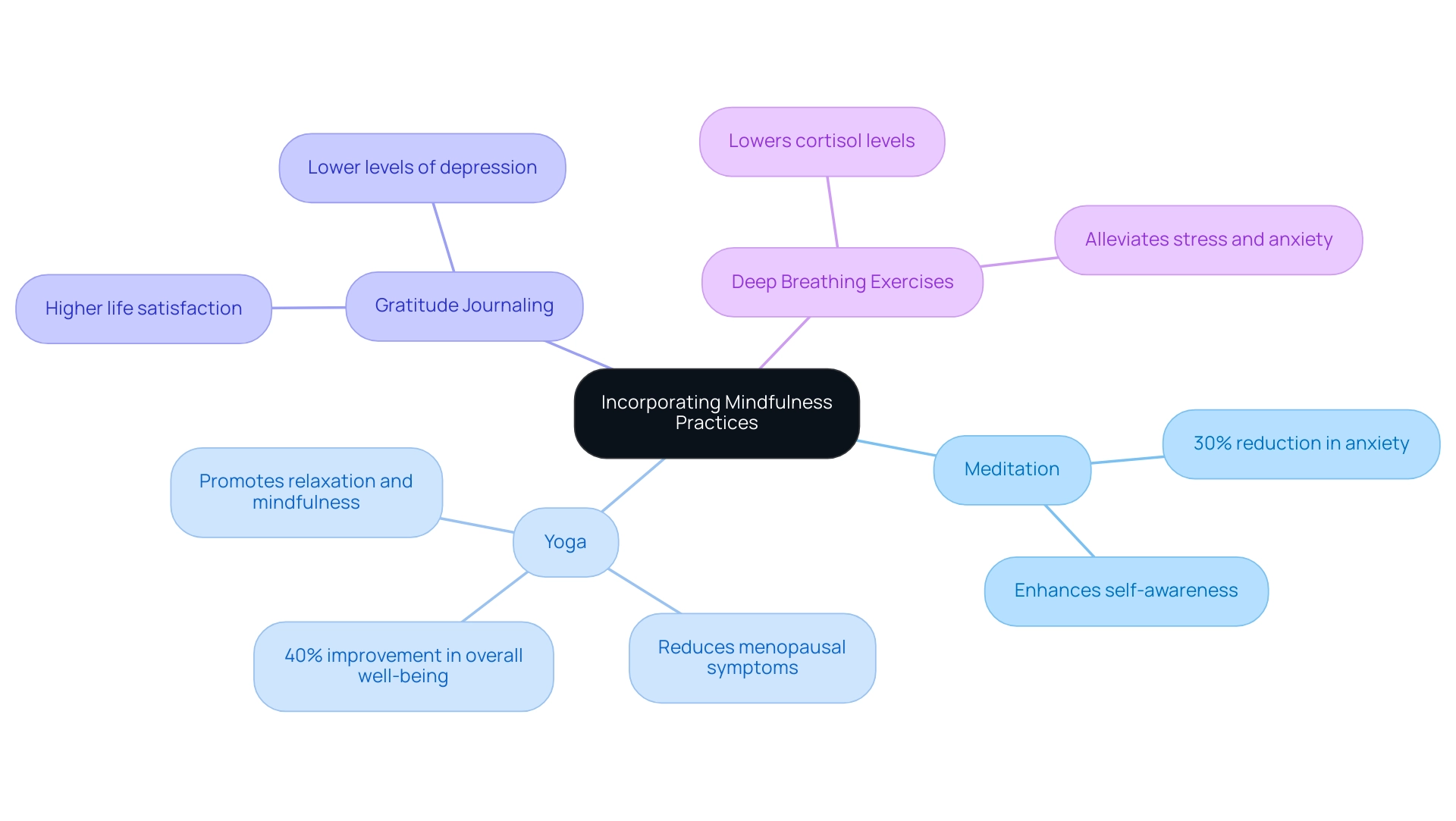
Exploring Hormonal Therapies
For individuals encountering the uncomfortable challenges of menopause, exploring hormonal therapy can be a transformative step toward reclaiming their well-being and vitality. Hormonal therapies, including estrogen replacement therapy (ERT) and hormone replacement therapy (HRT), offer promising relief from common symptoms such as hot flashes and mood swings, and can even aid in weight management. Recent studies suggest that HRT can significantly enhance the quality of life for menopausal individuals, although it is crucial to consider the advantages against possible risks, such as a higher likelihood of certain medical conditions.
Types of Hormonal Therapies:
Start by engaging in a dialogue with your healthcare provider about the various options available. Systemic therapies, which include pills, patches, and gels, provide comprehensive relief, while localized treatments, such as vaginal creams, target specific symptoms effectively.
-
Benefits and Risks:
It’s crucial to fully understand the potential rewards and risks associated with HRT. According to recent statistics, approximately 20% of menopausal women in the United States are currently using hormone replacement therapy, highlighting its prevalence. Benefits may encompass enhanced quality of life and symptom relief, while risks could involve an increased likelihood of certain medical conditions. Consulting with a healthcare expert can assist in creating a personalized plan that aligns with individual wellness profiles and concerns.
Monitoring and Adjustments:
Ongoing communication with your healthcare provider is essential. Regular check-ins will allow for the monitoring of treatment effects and necessary adjustments, ensuring that the therapeutic approach remains optimal and effective. Recent advancements in hormone therapies, such as bioidentical hormones and lower-dose alternatives, provide new pathways for treatment that may correspond more closely with patient preferences and wellness considerations.
By actively contemplating hormone therapies, individuals can make significant progress in managing their symptoms during this life stage and improving overall well-being. This proactive approach not only supports individual health but also fosters a healthier workplace environment.
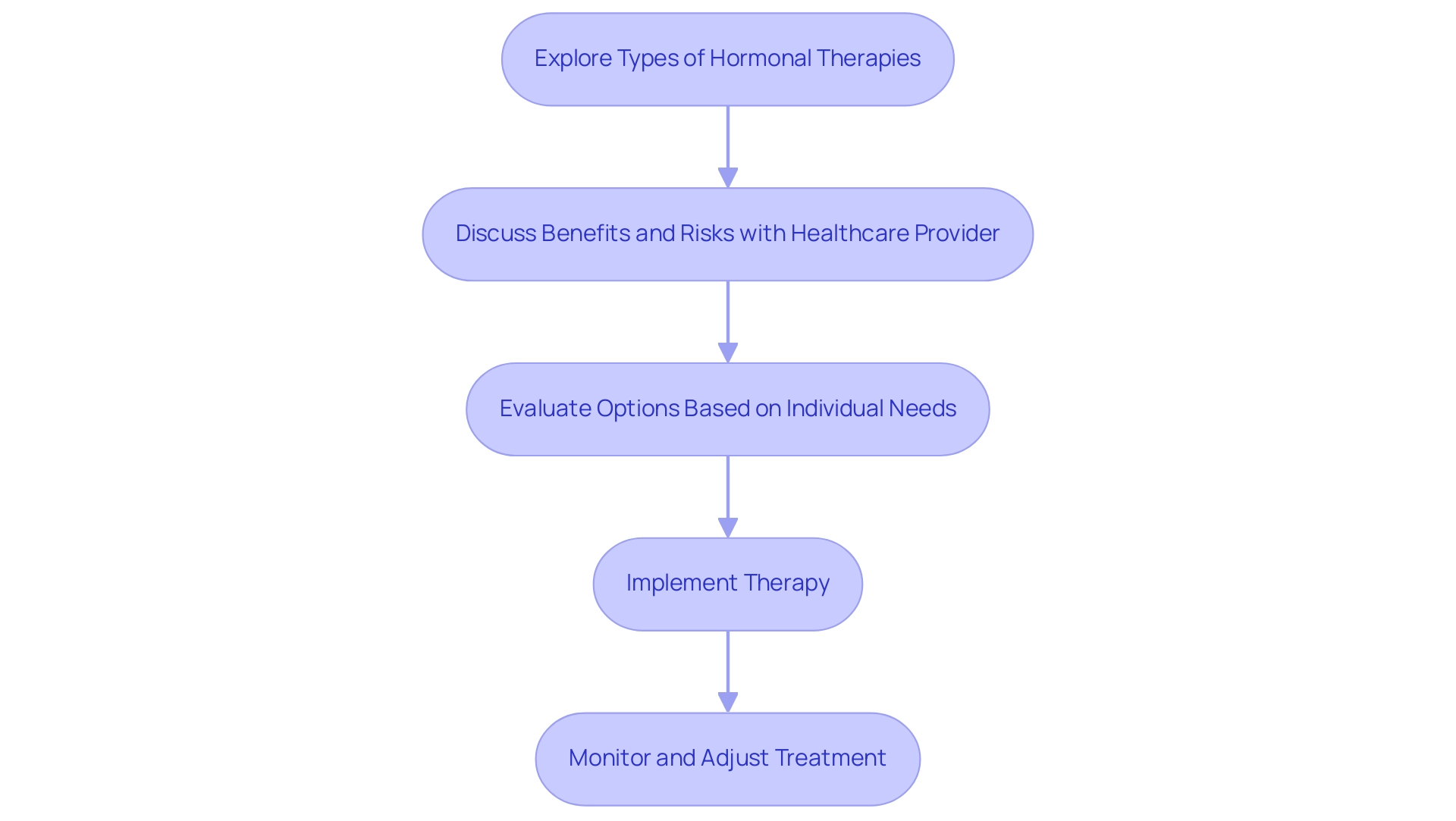
Building a Supportive Community
Building a supportive community is crucial for individuals facing the challenges of hormonal changes, particularly when tackling hormonal belly fat. The longitudinal Study of Women’s Health Across the Nation, which began in 1996 with a cohort of 3,302 participants, highlights the importance of social support in managing menopausal symptoms, including weight changes. Here are effective strategies to foster meaningful connections:
- Join Support Groups: Seek out local or online support groups specifically focused on menopause. Research indicates that support groups play a crucial role in the well-being of menopausal individuals, helping them manage hormonal changes that can lead to belly fat accumulation.
- Engage in Social Activities: Participate actively in community events, workshops, or fitness classes tailored for women. Regular exercise, as highlighted in the case study titled 'The Role of Exercise in Menopausal Health,' is a beneficial intervention for managing menopausal symptoms, improving mental health, and reducing health risks, including those related to weight gain.
- Connect with Friends and Family: Openly sharing your experiences with trusted friends or family can provide significant emotional relief and encouragement. Their support can be a powerful tool for resilience, especially during challenging periods when changes in hormones affect body composition.
- Utilize Online Resources: Explore dedicated forums and social media groups for this life stage, where women share insights and offer support. These platforms can serve as valuable resources for information and community engagement, enhancing your understanding and coping strategies related to belly fat.
By surrounding yourself with a nurturing support network, you can build resilience and navigate the complexities of menopause with increased confidence and ease. As noted by Santoro,
it’s OK to use medication and all the social cushioning you need to get through this time,
reinforcing the importance of seeking support in various forms. Embracing these connections, along with regular exercise, can significantly enhance overall well-being and help in managing hormonal belly fat during this transformative life stage.
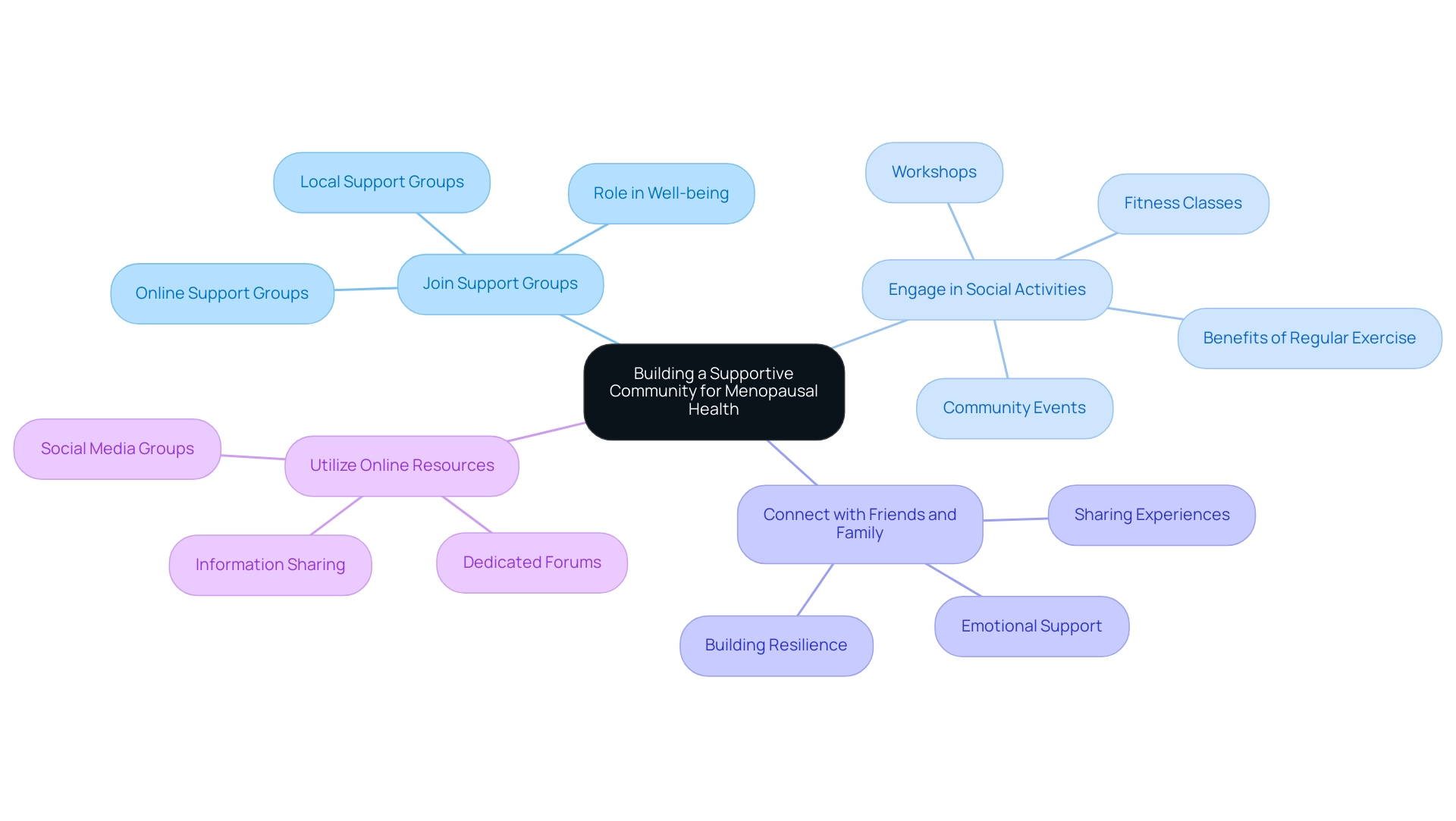
Conclusion
Embracing the transition of menopause is not just about managing symptoms; it’s an opportunity for women to take charge of their health and well-being. Understanding the hormonal changes that occur during this phase is essential, as it lays the foundation for informed decision-making regarding lifestyle adjustments. From adopting a balanced diet rich in whole foods to engaging in regular exercise tailored to individual needs, every step taken can significantly impact health outcomes.
Incorporating mindfulness practices and prioritizing mental health further enhances the ability to navigate this transition with resilience. Techniques such as meditation, yoga, and gratitude journaling not only mitigate stress but also foster a positive outlook, which is vital during this time. Moreover, exploring hormonal therapies under the guidance of healthcare professionals can provide additional support, allowing women to reclaim their vitality and improve their quality of life.
Building a supportive community is equally important. Engaging with others who share similar experiences can offer emotional relief and practical strategies for managing challenges like hormonal belly fat. By fostering connections through support groups and social activities, women can create a network that uplifts and empowers them throughout their menopause journey.
Ultimately, the transition through menopause is a pivotal phase that invites women to prioritize their health proactively. By embracing informed choices, seeking support, and implementing effective strategies, women can enhance not only their personal well-being but also contribute to a healthier workplace environment. Now is the time to take action and empower oneself and others to thrive during this transformative stage of life.




